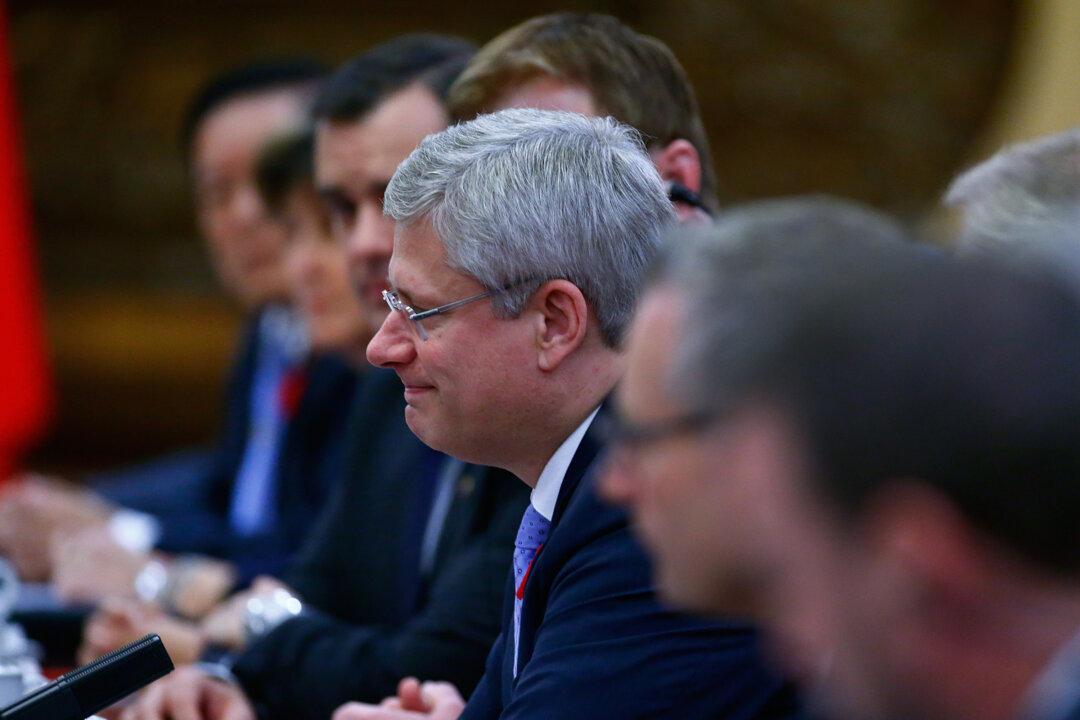OTTAWA, Canada—Canadian Prime Minister Stephen Harper is on his way home from China after securing a list of deals and meeting with Chinese leader Xi Jinping, among other high-level Chinese officials.
Harper told reporters on Sunday in Beijing that CA$2.5 billion worth of contracts were signed during his trip, but that it didn’t stop him from broaching more sensitive topics as well.
“You can rest assured that every single item that is important in the area of consular issues, human rights, governance, the rights of minorities—I have raised every single one of those,” he said.
Chinese State-owned Companies
Harper said the Chinese leader did not complain about restrictions Canada put on Chinese state-owned companies that invest in Canada, saying the issue did not come up, even behind closed doors.
Harper put the restrictions in place after China National Offshore Oil Corporation (CNOOC) bought out Calgary-based oil and gas company Nexen Inc. in 2012 for CA$15 billion.
Chinese diplomats had complained that the restrictions, which make it difficult for Chinese state-owned companies to take over oilsand companies, unfairly targeted China.
Harper said the Chinese regime has little to complain about.
“It would be difficult for [Beijing] to do so given that Canada’s investment climate is so much freer than the investment climate here,” he said, according to the Globe and Mail.
“So if anything, it’s on the other side that this issue really has to be addressed.”
Direct Currency Exchange
Harper met with several senior members of the Chinese Communist Party (CCP) and sealed a deal to increase the use of renminbi in trade, commerce, and investment between the two countries.
That deal will lead to Canada hosting North America’s first renminbi hub, allowing Canadian businesses to trade Canadian dollars directly for the Chinese currency without first going through U.S. dollars, a change that business groups say could save billions.
In signing the deal, Canada also becomes part of the regime’s effort to displace the U.S. dollar as the default global reserve currency, one of its long-term strategic objectives.
China-Canada Trade
Canada also announced new trade offices in Hangzhou, Xi'an, Xiamen, and Tianjin, adding to 11 already in operation. Harper is hoping increased exports to China will shrink the trade deficit Canada has been running with China, which reached $31.7 billion in 2012.
The prime minister’s office notes that China is Canada’s second-largest single-country trading partner with two-way merchandise trade reaching CA $73.2 billion in 2013, accounting for 7.7 percent of Canada’s world trade.
In that statement, the PM said he had strengthened the foundation of future business ties that will help Canadian business “access the incredible opportunities this crucial market has to offer.”
“This will in turn generate jobs and economic growth in Canada,” he said.
On Sunday, Harper noted however that no matter what, he wouldn’t sacrifice Canadian interests.
“We obviously want to have a good relationship but it has to be a good relationship that serves this country’s interests.”
That means there will be some challenges, he said, and he will raise issues when there are “significant difficulties between our governments.”





